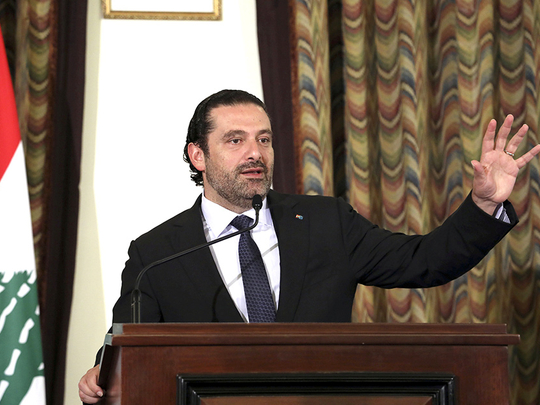
Manama: Lebanon’s Prime Minister Saad Hariri said that his country was ready to cooperate with Kuwait on resolving the issue of Al Abdali terror cell whose members were convicted of intelligence links with Iran and Lebanese militia Hezbollah.
The court ruling pronounced by the Cassation Court in June at the conclusion of a long trial affirmed the involvement of the Hezbollah in intelligence, coordination of meetings, payment of funds, and provision of weapons and training on Lebanese territory with the aim of destroying the basic infrastructure of the State of Kuwait.
Following the verdict, Kuwait sent a protest missive to the Lebanese government, urging it to assume its responsibilities towards “irresponsible practices by Hezbollah, a component of the government.”
Hariri made the trip personally to Kuwait in an attempt to control the damage and defuse the growing tension between the two countries.
“I conveyed to His Highness [the Emir of Kuwait] the greetings of the Lebanese people and the President of the Republic,” Hariri was quoted as saying by his media office.
“We clearly said that we condemn what happened regarding the Al Abdali cell and that Lebanon is prepared to cooperate, with all its agencies, to end this issue. There is a great Kuwaiti resentment towards it and they are right about it, and we in Lebanon will cooperate on this issue,” Hariri said.
The Kuwaiti people, State and Emir have always treated Lebanon and the Lebanese as they treat the Kuwaitis, he added.
“I hope that relations will improve. We came to tell the Emir and the Kuwaiti people that Lebanon is their country and the State and the government are against any security breach because we consider the security of Kuwait and Lebanon is one and we do not allow any breach,” he said.
Hariri told reporters that he hoped the Kuwaiti resentment would not turn into measures against Lebanon.
“Hopefully there will be no such measures. But undoubtedly there is resentment and we have to look at the issue and address things clearly and boldly because it is our duty as a state and as a government,” the prime minister said.
“Kuwait’s judiciary is clear and frank and there will be cooperation between the security services and the judiciary and we will cooperate to the maximum. What concerns me, regarding the people of Kuwait and His Highness the Emir who has always been a pioneer in helping Lebanon, is to preserve this relation between the two countries by all means.”
Hariri added that he would personally follow up the issue.
Al Abdali has been the hottest issue this summer following a final court verdict in June that overturned an acquittal by a lower court and reports that the convicts had disappeared to evade serving prison terms.
The Al Abdali case emerged in the open on August 13, 2015, when Kuwait’s Interior Ministry said that it busted a terrorist cell and uncovered a large cache of arms, ammunitions and explosives hidden underground at a farm in Abdali. The cache contained 24 hand grenades, 65 guns, 56 RPGs and 144kg of bomb-making material.
On September 1, 2015, Kuwait’s public prosecution said 26 defendants, including one Iranian, would stand trial for the possession of weapons, ammunition and explosives and espionage for Iran and Hezbollah.
It said that 24 defendants faced charges of intelligence with Iran and Hezbollah and of engaging in acts likely to undermine the unity and safety of Kuwait.
The trial by the Criminal Court was opened on September 15 and all the defendants present in the court denied the charges.
On January 12, 2016, the Criminal Court sentenced a Kuwaiti man and an Iranian national to death, one defendant to life in prison and 19 others to between five and 15 years in jail.
The verdicts were appealed and on July 21, 2016, the Court of Appeals upheld the death sentence against the Kuwaiti national, one life sentence and one five-year sentence.
However, it acquitted nine men who had been sentenced to 15 years in prison, and reduced three other 15-year sentences to between two and five years and one 10-year sentence to five years.
It also reduced two 15-year sentences and two five-year sentences to fines of 5,000 Kuwaiti dinars.
The court confirmed the acquittals of three other defendants and a fine imposed on another defendant was waived.
Two cases were not examined as the defendants, including the Iranian national, were tried in absentia and could not lodge appeals.
The defendants who were acquitted or fined by the Court of Appeals were allowed to go home as the case was referred to the Cassation Court, the highest court in the country.
In June, the Cassation Court cancelled the acquittal of defendants and sentenced two of them to 15 years in prison, 15 defendants to 10 years and three defendants to five years in jail.
In July, Kuwaiti daily Al Siyassah said that 14 Al Abdali Cell convicts fled to Iran after they used small boats to reach international waters where an Iranian vessel was waiting for them.
However, the interior ministry dismissed the flight report, saying there was no evidence that the convicts had left the country. It published the pictures of 16 fugitives and appealed for assistance from Kuwaitis and residents in locating them.
On Saturday, the ministry said that its agencies arrested 12 of the fugitives in different areas of the country.
On Sunday, the ministry announced that the 13th convict was held.
The manhunt is still on to capture the remaining fugitives.











